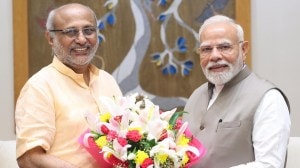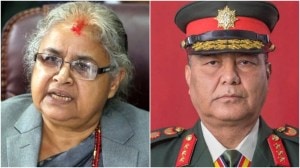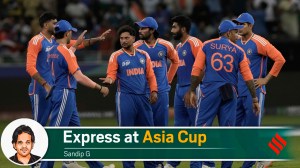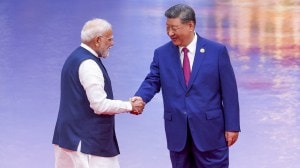Confident Kharge or hopeful Tharoor? Congress will vote today for new party president
Party set to elect first non-Gandhi chief in almost 25 years; Rahul Gandhi to vote at Bharat Jodo Yatra campsite in Karnataka.
 As the Congress votes Monday to elect its next president -- its first non-Gandhi chief in close to 25 years -- emotions in the campaign teams of both Kharge and Tharoor were starkly different. (File)
As the Congress votes Monday to elect its next president -- its first non-Gandhi chief in close to 25 years -- emotions in the campaign teams of both Kharge and Tharoor were starkly different. (File)Mallikarjun Kharge is confident of scoring an emphatic win with the leadership at all levels backing him as the unofficial official nominee. His challenger Shashi Tharoor’s hopes rest on the secret ballot or, as his camp puts it, the “hidden” or “silent” support of those yearning for change in the party.
As the Congress votes Monday to elect its next president — its first non-Gandhi chief in close to 25 years — emotions in the campaign teams of both Kharge and Tharoor were starkly different. On one side was supreme confidence and on the other, cautious optimism.
For both, the race was “hectic” and “exciting” — from whistle-stop tours of states, multimedia campaigns, social media promotions, appeals and manifestos, media interactions, interviews and town halls. Kharge (80) and Tharoor (66) threw in everything they could over the past ten days to reach out to the 9,850-odd party delegates who are eligible to vote across the country.
On Sunday, in a last-minute push, Tharoor tweeted an image of the ballot paper. He wrote: “Breaking News: the @incIndia Election Authority has changed the requirement for a vote from writing “1” against the preferred candidate’s name to a tick mark. Delegates please note — a tick mark is needed in the box next to my name!”
Breaking News: the @incIndia Election Authority has changed the requirement for a vote from writing “1” against the preferred candidate’s name to a ✅ tick mark. Delegates please note — a tick mark is needed in the box next to my name! pic.twitter.com/IVy8AbGsMt
— Shashi Tharoor (@ShashiTharoor) October 16, 2022
Earlier in the day, his camp had approached the party’s election authority saying the requirement of writing ‘1’ against the preferred candidate’s name on the ballot could create confusion as Kharge’s serial number was ‘1’ and Tharoor’s ‘2’. The votes will be counted Wednesday.
Tharoor was always expected to wage a spirited campaign till the end. The suave and articulate MP from Thiruvananthapuram is a brand and one of the most prominent liberal voices in the country. He also, perhaps, has more supporters outside the Congress than within it given his presence on social media, reputation as a writer and public speaker, and image as a rebel with a cause.
On the other hand, almost no one thought that Kharge, the clear frontrunner in the race, would run such a hectic campaign. The veteran travelled to 14 state capitals in ten days, meeting PCC delegates from over 20 states and union territories. From Chennai to Srinagar and Guwahati to Ahmedabad, he did a whirlwind tour despite, or “undeterred” as his campaign puts it, the perception that he was the establishment candidate.
Tharoor, too, visited ten states but the top leaders of the party there gave him a cold shoulder, barring in Madhya Pradesh. In contrast, almost the entire state leadership — from PCC presidents and CLP leaders to state office-bearers — assembled to hear Kharge, prompting the Tharoor campaign to draw the attention of the party’s election chief Madhusudan Mistry.
In fact, the Tharoor campaign approached Mistry several times over discrepancies in the voter list and office-bearers openly expressing support for Kharge, the latest being Rajasthan Chief Minister Ashok Gehlot. Tharoor spoke of a lack of level-playing field.
Kharge ran a professional campaign with control rooms operating at his Rajaji Marg residence and two in Bengaluru making personal phone calls to delegates, sending out IVRs, text messages and short video clips. A team of leaders — Ramesh Chennithala, Pramod Tiwari, Deepender Hooda, Syed Naseer Hussain, Gourav Vallabh and Gaurav Gogoi — accompanied him to various states.
There were teams coordinating his media interactions, press conferences and travel. His campaign enlisted local leaders to speak to delegates in their native languages. His team also held two Zoom meetings with his 136 election agents. “Kharge took the campaign very seriously. He is a seasoned campaigner. Having won 11 elections, he knows how to fight an election,” a key member of his campaign said.
The Tharoor camp said his campaign was largely volunteer driven. Coordinated by Salman Anees Soz and Sandeep Dikshit, it sent mass WhatsApp messages, emails and IVRs, and made phone calls. Apart from leveraging his social media presence, Tharoor also issued a manifesto listing out his promises.
“We are sure the elections will throw up a surprise although we are not sure about the scale. There is a yearning for change. In many states, the existing state leadership is unpopular… people, especially the young leaders, are unhappy and we feel Tharoor could be the vehicle for expression of this dissent,” one of his campaign managers said.
Tharoor repeatedly quoted the Gandhis as having told him that they would stay neutral, and emphasised on the secret vote — the first, to dispel the perception that Kharge has the blessings of the Nehru-Gandhi family and the second, to nudge “possible” fence-sitters and those who fear their votes would be traced.
According to Mistry, all arrangements were complete for voting day — the first such contest since 2000 when Jitendra Prasada took on Sonia Gandhi. The delegates can cast their votes in 67 polling booths set up in state capitals and at the AICC headquarters in Delhi.
Kharge will vote at the PCC office in Bengaluru. Tharoor will vote in Kerala. And while party chief Sonia Gandhi and Congress general secretary Priyanka Gandhi Vadra are expected to vote at the AICC headquarters, Rahul Gandhi will cast his vote at the Bharat Jodo Yatra campsite in Karnataka’s Sanganakallu in Ballari along with around 40 others with him.
Photos



- 01
- 02
- 03
- 04
- 05



























